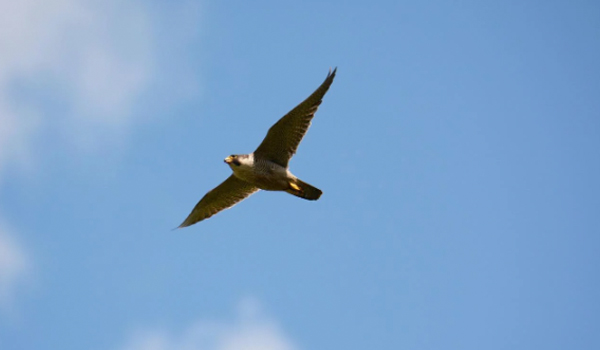Air Support Unit joins fight against illegal targeting of Peregrine Falcons
‘Operation Raptor – Peregrine Watch’, an initiative by the Police Service of Northern Ireland (PSNI) along with the Partnership for Action against Wildlife Crime (PAW) Bird of Prey Sub Group, will now have ‘eyes in the sky’ as the PSNI’s Air Support Unit lends its expertise and cutting-edge technology to bring an end to the illegal persecution of birds of prey.
A special licence granted by the Northern Ireland Environment Agency (NIEA), and specific permissions obtained with the assistance of the Northern Ireland Raptor Study Group (NIRSG), has and will enabled police to deploy hi-tech drones to carry out checks of various sites around Northern Ireland where Peregrine Falcons are known to nest, breed and live.
Peregrine falcons in Northern Ireland are a protected species under the Wildlife (Northern Ireland) Order 1985 as amended by the Wildlife and Natural Environment (NI) Act 2011, which safeguards all birds of prey from persecution and disturbance. The penalties for crimes under the Order include, but are not limited to, a fine of up to £5,000 per offence and up to six months imprisonment.
The police drones will be used to view and assess falcon nesting and breeding areas that may otherwise be inaccessible and will allow the various agencies involved in PAW to keep a close check on nests, particularly in ‘at risk’ areas, in the hope of reducing instances of illegal poisoning, shooting, trapping and taking of peregrine falcons and their eggs.
Speaking about Op Raptor – Peregrine Watch, PSNI lead for rural and wildlife crime, Superintendent Johnston McDowell, said: “This initiative between the PAW Bird of Prey Sub Group and our Air Support Unit, working alongside local officers, is a direct result of birds being targeted with very serious and dangerous substances in a number of areas across Northern Ireland.
“Many of the poisons identified in previous cases are deadly not only to our precious wildlife but also to humans, and so the potential impact could go beyond the persecution and destruction of our beautiful native birds of prey.”
The initiative also encourages people to report any suspicions around birds being targeted. Police work closely with our colleagues in the Health and Safety Executive who are responsible for Biocides, and the Department of Agriculture and Rural Development who are responsible for Rodenticides, to identify poisons being used and take steps to identify and prosecute offenders.
Supt McDowell added: “The PSNI is committed to working with partner agencies to tackle wildlife crime through prevention and education, as well as enforcement, and will continue to work hard to combat wildlife crime.”


